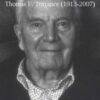Category: Evangelical Calvinist
Writings from the blog: Athanasian Reformed (aka The Evangelical Calvinist). Senior Reformed scholars present a coherent and impassioned articulation of Calvinism for today’s world.
ALL Interpreters of the Bible Are Theological Interpreters
Let me say another word about theological exegesis (I prefer that to theological interpretation of Scripture, as far as the language goes). I’m not sure I made myself as clear as I would like to have in my last post: everyone and anyone who attempts to interpret the Bible does so “theologically.” I don’t think this is appreciated enough, at all! In order for folks to appreciate this properly they might have to reorientate their thinking a bit. No matter what belief system, or belief reality someone is committed to, they bring this to the text of Scripture. So, if…
Podcast: Believe and You Will Be Saved
A recent podcast I did on the simplicity of salvation. I sketch performative based schemas of salvation, and then counterpose those by way of offering what I take to be a genuine offering of God’s free grace for the world in Jesus Christ (a non-transactional/non-performative based doctrine of salvation). Click Here Athanasian Reformed
Three Vignettes on Reading Scripture Theologically Among the Evangelicals
The following are three vignettes on Theological Exegesis or Theological Interpretation of Scripture (TIS) that I just posted today on Facebook. I think, in the main, so many Christians are so far removed from all things theological or actual, when it comes to excavating the reality of the faith once and for all delivered to the saints, that when some do attempt deep dives into such things they simply attempt to apply “common-sense” everyday linguistic and cultural reading theories onto the text of Scripture that Scripture itself resists. Scripture is Holy because its reality is in Jesus Christ. Scripture is…
A Spoken word Poetics on the Living Word of God
As a radical Protestant I am a theologian of a radical theology of the Word. This means that I first understand the Word, to be the eternal Logos, the begotten Son in the bosom of the Father. I understand his free election (Deus incarnandus) to be for us to entail what has become the written and proclaimed Word. So, the creaturely media, such as written and proclaimed Words are, in order, at least for the former to be living and active, requires that its res or reality be antecedently given in and from the eternally living and active Word of…
PhD Update, Saint Alcuin House Seminary
I have been accepted into the PhD program in Systematic and Historical Theology at St. Alcuin House Seminary, an Anglican institution of the Benedictine order in the Communion of Anglican Churches. I’ll give more details as I have them. They have been accredited in the past, and are currently in application for renewing their accreditation (I believe the accreditation comes through Cambridge Assessment International Education of Cambridge University). Athanasian Reformed
Kierkegaard, Confronting the Danish god of Hegel and the god of the Philosophers Writ Large
God is not “a datum or factoid that is best understood with the scrutiny of a scholarly mind.”[1] And yet, enter the fray of theological social media, enter the faculty lounges across many seminaries and divinity schools, or simply attempt to learn of God with more depth by reading theology books unawares (i.e., without critical resource to know otherwise), and you will end up coming up against a notion of God that has nothing do with the God Self-revealed in Jesus Christ. Whether that notion be informed by the scholasticism of Aristotelian or scholastic vintage, or it be of more…
A Devotion: Christ, ‘Closer to us than we are to ourselves’
5 One person regards one day above another, another regards every day alike. Each person must be fully convinced in his own mind. 6 He who observes the day, observes it for the Lord, and he who eats, does so for the Lord, for he gives thanks to God; and he who eats not, for the Lord he does not eat, and gives thanks to God. 7 For not one of us lives for himself, and not one dies for himself; 8 for if we live, we live for the Lord, or if we die, we die for the Lord; therefore whether we live or die, we are the Lord’s. 9 For to this end Christ died…
Against the God of classical Calvinism and Arminianism From the For-ness of God for the World in Christ
The God of classical Calvinism and Arminianism is the same God, in the sense that their respective doctrines of God find resource in what Richard Muller identifies as ‘Christian Aristotelianism.’ How the Christian thinks of God will determine all else following, theologically. Since the actus purus (‘pure being’) god of Aristotle stands structurally and materially behind the way that Calvinism and Arminianism generally conceive of a God-world relation, what happens is that they must construct a system wherein this God remains untouched by said creation/world. In this effort, said systems have come to think of this God-world relation through a…
The Relationship of Natural Science to Theological Science in the Thought of TF Torrance
Here is some TF Torrance on the way he thinks the natural sciences and theological science might relate; might even complement each other from their own distinctive verities. . . . theological science and natural science have their own proper and distinctive objectives to pursue, but their work inevitably overlaps, for they both respect and operate through the same rational structures of space and time, while each develops special modes of investigation, rationality, and verification in accordance with the nature and the direction of its distinctive field. But since each of them is the kind of thing it is as…
The Blog Just Surpassed the Million Hits Mark
I just noticed that my blog just went over a million hits. Thank you to all my readers and lurkers for making this blog what it is. I started blogging full time in 2005, and in the first four years of my blogging I foolishly moved around from url to url, to this new blog and that one. I eventually stuck with this one starting in 2009, and it has remained a place of refuge for me; in regard to being able to unload my thoughts in written form. I plan on blogging until the Lord returns, or He takes…








